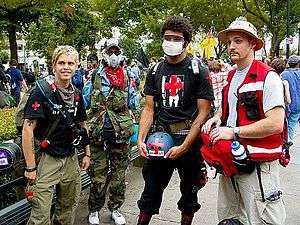Street medic
Street medics, or action medics, are volunteers with varying degrees of medical training who attend protests and demonstrations to provide medical care such as first aid. Unlike regular emergency medical technicians (EMTs) or paramedics, who serve with more established institutions, street medics usually operate in a less formal manner.[1]

Street medics may treat trauma injuries, chemical deterrent and other crowd control weapon ailments, animal attacks, as well as general care for things like heat exhaustion, epileptic seizures, and general well-being.
History
Street medics originated in the U.S. during the Civil Rights Movement and anti-war movement in the 1960s.[2] They conceived of medicine as self-defense, and provided medical support to the American Indian Movement (AIM), Vietnam Veterans Against the War (VVAW),[3] Young Lords Party, Black Panther Party, and other revolutionary formations of the 1960s and 1970s. Street medics were also involved in free clinics developed by the groups they supported. The street medic pepper spray removal protocol (MOfibA - Mineral Oil followed immediately by Alcohol) was later adopted by the U.S. military. Because the MOfibA protocol can cause severe damage to the patient if done incorrectly, it was largely replaced by the LAW (Liquid Antacid and Water) protocol.[4]
See also
- Emergency medical responder (EMR)
- Certified first responder
- Wilderness First Responder
- St John Ambulance
References
| Wikimedia Commons has media related to Street medics. |
- Blanding, Michael (2003-02-20). "Medic!". The Boston Phoenix. Archived from the original on 2006-10-05. Retrieved 2006-10-23.
- BUCCINI, CYNTHIA K. (2010). "Street Medicine" (PDF). Boston University.
- Nicosia, Gerald (2001). Home to war : a history of the Vietnam veterans' movement. Crown Publishers. ISBN 0-8129-9103-6.
- Luis Manriquez (Director) (2004). Street Medic (DVD). Archival and new footage from the U.S., 1968-2004.CS1 maint: location (link)